
It's very rare these days to talk about a genuine fast rising blues rock star. The UK has of course seen a few previous contenders such as Johnny Lang and Kenny Wayne Shepherd who never quite fulfilled their potential but in Joe Bonamassa you have an artist who not only fits the bill, but he looks like he is here for the duration.
Relatively speaking he is still a young man, though with a 7 album solo career behind him plus his early years of being a child protégé including playing with the likes of BB King and later in his teens with the junior all stars Bloodline, Joe has already more than paid his dues.
And while his last album 'You & Me' topped the Billboard blues charts and appealed to rock fans in equal measure, what makes Bonamassa such a hot property is the fact that he crosses over generations with an open ended rock blues hybrid. He draws heavily on the late sixties/early seventies British rock blues style, that started with the British invasion of the US and ultimately spawned the likes of Jethro Tull, Led Zeppelin and Bad Company. But what keeps Bonamassa more interesting still, is his two stated objectives of keeping the blues fresh and vital and also his refusal to be trapped by the genre.
With his most expansive album to date, 'Sloe Gin' being set for a late summer release, Joe is over for a whistle stop UK visit anchored around the Rhythm Festival date and a handful of sell out club dates. Earlier in the year Joe reached new heights of popularity in the UK when he filled the Shepherds Bush Empire, which represented a quantum leap from clubs to concert hall level. And with the new album he raises the bar to new heights, dragging his blues roots into new directions to include Rock, folk, country, and acoustic songs that are occasionally played with a Zeppelin twist.
Together with innovative producer Kevin Shirley, Joe has produced a benchmark of an album, on which his singing reaches a new level, and his guitar playing fleshes out the palette rather than dominates it. And as Joe goes on to discuss below, there is a strong sense British blues rock history in his music that will appeal both to those of us of a certain age and is vibrant enough to pull in younger fans that may be oblivious to the music's origins. And it is with his British connection that we start, as over the course of little more than 12 months, Joe has stamped his indelible mark on the UK.
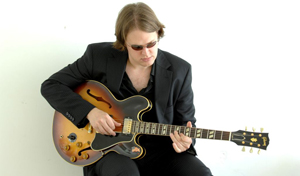
Were you surprised at how quickly you have achieved success in the UK?
Very much so. I'm really honoured by the fact that the UK has been appraised of what I'm doing. I'm really happy about that. And it's really been little more than over of a year since we have gone from playing 200 capacity clubs to filling the 2000 capacity Shepherd's Bush Empire. In fact it took about 7 years to achieve the same kind of level back in the States. We had already done some work in Europe building things up though festivals etc, but the UK has been a real surprise. The response to the new album has been good too, and I'm very grateful for that.
'Sloe Gin' might well be your best CD so far?
Thanks a lot, that's great to hear. I think part of it is the fact that with a little bit of success you get the luxury of having more time, and something of a budget. I also got to work with Kevin Shirley who is really great, and who came up with some songs and creative ideas that took me into different directions.
Before we talk about the new album, let me ask you about the special relationship you seem to enjoy with late 60's British Blues. Do you think perhaps that because you reinterpret the music of that era that people have picked up on you so quickly?
I think some of it is due to that yes, but for me it's a bit of a weird thing, cos in August I'm going to host a show on for a serious Sattelite radio on British Blues. So maybe people are drawn to that aspect as I'm playing the old British blues which has always been my favourite stuff, mainly because it was so fiery!
It all came together for me when I was a kid listening to my dad's record collection. And now it seems to have stuck with me.
Do you see any sense of irony that it took the British Invasion to wake the Americans to their own blues culture, and years later you are almost doing the reverse here?
Right. In a way yes, but to me it was a natural thing as people like Eric Clapton, Peter Green, Paul Kossoff, they are my Muddy Waters Robert Johnson's etc, and they are my heroes.
What attracted you to that period of music in the first place?
Well basically there were no rules back then and that was the thing for me. You can hear the blues in the early Prog Rock, you know, and you can hear the blues in early Jethro Tull and stuff like that, so I love that plain canvas, with no rules, and that's what I try and do. I mean I can't make a standard blues album from start to finish. It would be very difficult for me, as I wouldn't really know what to do.
You seem to have immersed yourself in that music from a very young age?
I was totally into it from day one. The Jeff Beck Group got me going. In fact it was Jeff Beck's 'Truth'. I was thinking, what is that sound? and the reverb, the Les Paul sound, the whole thing. And it all came from listening to my dad's records. He had an old copy of 'Beck-Ola', some Led Zeppelin, Free's 'Fire & Water', and John Mayall's Blues Breakers album.
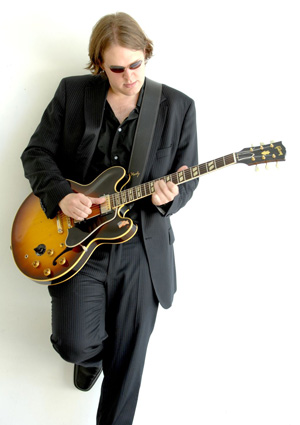
You've said in the past that your goal is to keep the blues fresh and alive, is that a difficult thing to do?
Yes it is, because it is very difficult not to repeat yourself, and to come up with something different. So you have to bring in outside influences and mash them all together. I've got to say though that not everything I've tried has worked.
Were you playing this kind of stuff before you started writing your own songs?
I was playing classical music, and I was playing the blues and some rock, and really trying to find a way to try and push it all together. And then after a period of time it suddenly comes out in your own style.
In your teens you were in Bloodline, basically a band made up of rock star's kids, what were you doing in that band?
Basically having a lot of fun as a teenager (laughs). But in fact musically speaking, we were doing mostly Southern Rock stuff like The Allman Brothers and some Texas stuff, but mostly by proxy as I was in a band! I certainly was not the only person, so I kind of went where the rest of them were going.
Let's talk about 'Sloe Gin' which is a superbly played, well produced and well thought out record with a good balance of your own songs and covers, and an electric and acoustic divide. You also seem to have paid particular attention to the importance of the running order of the tracks. Did you approach the album with a bigger picture in mind?
Well when I came to doing this record, I specifically thought about the way some of the older records - especially my favourite records by Jeff Beck, Led Zeppelin etc - were set up. So for me, 'Sloe Gin' was my equivalent of Rod Stewart's first album 'Every Picture Tells A Story'. It has rock and acoustic elements and a couple of obscure covers on it. And really that album was my inspiration for 'Sloe Gin', in as much as the acoustic stuff will work with the electric stuff if it is all sequenced correctly, and then it will make sense.
You seem to set yourself high standards and tough goals in taking on tracks like Chris Whitley's 'Ball Peen Hammer' and Bad Company's 'Seagull'. And both songs have been transformed by lavish production. Was that Kevin Shirley's idea?
Most of it. The arrangement on 'Seagull' was mostly his idea, he would take the bare bones of a song and go, I think we can do a good job on that.
So he brought you the song?
No, I actually brought the song to him, I'd started doing it as part of my live shows. I'd come on at the end of the show and sing it. I'd try and copy Paul Rogers, and it went over great on the two occasions I did it. So when it came to doing the acoustic part of the album, I thought, 'Seagull', yeah!
And as regards Chris Whitley, I both knew him and had toured with him about 7 years ago, when I first started out. And there I was with my power trio, and he would just walk on with his dobro and stomp box and just smoked me. And I was just like, how does he do that?
And in fact that's how I got the song 'Woke Up Dreaming' on the 'Blues Deluxe' album.
A lot of it was based around the stuff he did that features that really manic and just wild feel.
And you put a really big rock arrangement around it?
Yeah, I also really likes the lyric and the title to 'Ball Peen Hammer', so we put the acoustic track down first, and then Kevin said, lets see if we can get the drums going. And then once the drums were on, you go, OK let's crank it up as far as it will go, and within an hour we had this exploding track (laughs).
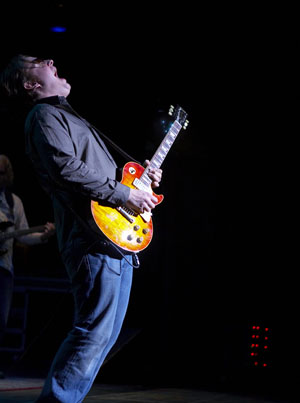
Photo © Steve Janowicz
So this transformation from acoustic to electric happened in the studio then?
Yes, in as much as Kevin was so great about using the creative elements in the studio, so he built the track up from it originally just being me and the dobro and it turned into an explosion!
Producer Kevin Shirley (whose credits include Zeppelin, Rush, and Dream Theater to name a few) worked with you on the previous 'You & Me' album. He's come up with some startling arrangements on this album. Was it the case that you would have an idea and then he would add to that?
Well Kevin is a world class producer. My relationship with him is (pause and laughs), well, we have just been out drinking actually and when we get together in a bar, we close it down (laughs). But really, he was the driving force on my last two albums. It was him that said, if you want to make the same old blues album then I'm not your guy!
So he basically wrote me a blank cheque in terms of what I could do. And I'm game for anything. So he said he would let me know if anything was too left of centre, or stuff like that. So you slowly expand your horizons while paying attention to what the band will accept as well of course. So it came together bit by bit, like, here's some blues, some guitar hero stuff, and here's some songs, some melodies, and some strings!! This record even has a hammer dulcimer on it, so it's a very creative record.
Where did some of the other covers come from, like John Martyn's 'Jelly Roll'
That came from my last UK tour from the support band Stone Sole River from Sheffield. Mike the guitarist turned me on to John Martyn. So I was like, you know, I'm always interested to hear a new (to me anyway) British Blues artist. In fact if there's a Brit Blues guy I've never heard so far, I'll go out and get the cd. I mean I've heard every Texas guitarist etc etc, so I put it on and found the 'Jelly Roll' track, and thought this is cool and obscure and I could see how it could fit in with my record. I was looking for something to bridge the gap between 'I Woke up Dreaming' and another dobro piece, so it was the perfect track.
Could you understand John Martyn's singing?
It's brilliant, but I did have to go to the internet to look up the lyrics (laughs).
You always seem to have made it a point to include a certain amount of covers on your albums, a bit like Manfred Mann who in the past transposed obscure covers in to commercially successful songs. Is that still the case?
Well I've never been a prolific song writer, that is to say I can write a good song, but it takes a while. Some people can build a house in a day - they have the tools and skills etc - and I can probably do that too but it would take me six months, brick by brick!! My confidence in my song writing is offset by the fact that one of my fears in life is to write a bad song, a shitty song.
On 'Sloe Gin' you have reprised one of your best ever songs, 'Around the Bend' and come up with a lovely acoustic ballad 'Richmond', one of your very best songs.
Thanks a lot, but lyrically a lot of the credit for 'Around the Bend' has to go to Will Jennings who predominantly wrote the lyrics for that song. He's really great and has written some of my very best songs for me. But actually 'Around the Bend' was the second version of the song that I've recorded (the original version was on 'Had To Cry Today'). And the first version we recorded was a long time ago and I didn't like and it always stuck in my head that it is a great song but I did a shitty version of it.
We were in a strange headspace when we did it, a sort of half assed Peter Gabriel thing and it didn't work for me. And really I was so disappointed with myself that I had let it go like that. As time went by and we'd done a few more records I think people forgot about it, and since nobody had paid any attention to it the first time I thought lets re do it. And Kevin did a great job again recording it. So now I'm really happy with the version. Now it's like, yes!!
'Richmond' was a really good song I wrote in open C. I was in a cool hotel in Washington DC - a very cool place. In fact I used to live in Washington and loved it and kind of missed it and the song reflects that. But I thought Washington didn't have the same ring about it as 'Richmond' (laughs). But I wanted to do this song and came up with it in about an hour, but having done that, I wasn't immediately confident enough to play it to any one. So I ended up recording it on my little ibook, and just sang into the microphone. Later on I submitted it to Kevin as one of the possible songs for the album, and he said, what's this song called 'Richmond'? So we ended up doing this lovely acoustic version of it, and it doesn't even have a guitar solo in it!
Do some tracks sound better to you when you hear them later in the context of an album?
Yes I think that is definitely the thing on this album, especially after it was all sequenced, and especially as originally we did this record in two halves. The first stuff we recorded was acoustic, so here I am going, OK well now we have a kind of acoustic record-ish - an EP possibly? - and then we went back to it in April and did all the electric stuff. But this was still a gamble on my part as we still only had 5 electric songs, and that was it, we didn't have any more time because immediately after the session was over the next tour started.
So I was a bit worried until we put it all together and got to play it all because if the acoustic and electric hadn't gone together then I was still thinking we had two EP's and not enough for a whole album. So Kevin and I really wracked our brains a couple of times and went back and forth on the sequencing, until it worked as whole, thank you very much!! (laughs).
There was some luck involved there. We sweated it out, but Kevin was always confident about the outcome.
What about 'Dirt in My Pocket', that has a real retro feel to it doesn't it?
Yes it does, I wrote that song with Jim Huff. I was at that stage in the record when I needed something up tempo, and in a sense it was a song written to order. I had the Zeppelin kind of riff, and it was up tempo, so it came from that.
And then there is the title track, a real barnstormer
'Sloe Gin' was an obscure choice, but Kevin remembered it from when Tim Curry first put it out in 1978 I think only the chorus was 'I'm so fucking lonely'. So I didn't want to do that and changed it to 'so damn lonely' which works just as well. It works great in the live set as it sort of comes in right slab dab in the middle. So you start your set with a high, then maybe do a ballad or whatever and then right in the middle you get, wow, the big number, then some acoustic thing and it works great. So I'm very happy with that song.
You also seem to be singing better than ever on 'Sloe Gin'.
Well I'm very pleased you think so as I think I've worked as hard on my singing as anything in my whole career.
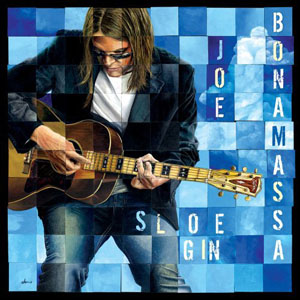
You also seem very confident and comfortable in the studio, and with the recording process, while a lot of bands are the opposite?
Yes but Kevin helps me with that though. Well I do find I play much more freely live and in some ways end up making more mistakes in the studio. And sometimes I do get a case of the red light syndrome, and I don't really know why. It's ridiculous that the fear of embarrassing my self in front of maybe four people is far greater than doing that in front of say 2,000 at Shepherds Bush. I don't understand it, but that's how my mind works. I think that one of the reasons is that in a live situation I have comfortable places where I 'sit' and every move is pretty much the same every night, so I know where to go to get that sound in my head. The studio situation is obviously different with the headphones, and I'm thinking where are the drums, and where is this and that etc?
Going back to your childhood as a guitar protégé, did you ever feel a weight of expectation on you to become a pro guitarist?
Not really as I always really wanted to do this. I always wanted to play guitar for a living, and I always looked up to guitarists. My dad took me to my first concert when I was six, and it was Gregg Allman, and I saw Dan Toller and saw all those guys playing , and thought, yes, that's a cool job, I can think of a lot worse ways to earn a living, so I kept my mind to it.
And in a sense you are one of the first generation of new players who have consistently stuck to their career path, and not succumbed to the down side of rock?
Well we did have a drink last night (laughs), but! I couldn't do that every night. And really when you come up in a different era, you can look back at what has gone before and you can learn from that. I mean it is pretty easy to burn yourself out in this life style as your time is pretty packed out. But I enjoy touring. In fact I love touring as I get bored at home. In the couple of weeks we have off I often cook, watch TV and don't drink, and don't really play much.
Do you consciously stay away from music when you have time off?
We might have a couple of weeks off and during that time I very rarely pick up the guitar then. I like coming up with new ideas, and if one of them requires you to play them, then that's cool. And if you're not inspired to play then you don't have to play. During that time off I might come up with a few ideas, and then play around with them, but otherwise I don't feel like I have to play.
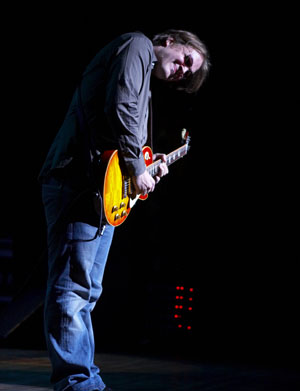
Photo © Steve Janowicz
Going back to your early career 'A New Day Yesterday' you worked with the late Tom Dowd, the famed producer. How did you find that experience?
Really it was a tremendous experience for me. He gave me so much confidence. He'd say, here's when you play Clapton, here's where you're playing, so and so, and here's when it's like you. He wrote the book on Cream, and really was one of the nicest guys I ever met. He was like my best friend. He really was a most brilliant man, in that old fashioned style. He was a renaissance man of the highest order, he knew about science, maths, politics and music. He was also the best musician in the room, no matter who was in the room. And he always gave credit where it was due.
I was out New York once for dinner with some Sony Music people and different producers, and they saw Tom Dowd. So they couldn't resist asking him what was it like recording Aretha Franklin. Now most producers would go, oh yeah, it was great, I did this and that, but Tom simply replied, it was lucky for me that I didn't screw it up, 'cos how do you screw up Aretha Franklin? She's the most brilliant singer, and all I had to do was turn on the microphone, and that was what it was like.
Tom was one of the special people I have been lucky enough to be around, and I guess I'm good too, so it's all worked out well for me.
And of course you worked with BB King when barely in your teens?
He taught me so much about stage craft and had real presence. He'd just go on and say, good evening, I'm BB King', and I'd go, yes you are!!!(laughs)
And now you are also putting something back into the school aren't you?
Yes I'm trying to teach kids a bit. I really just talk a little bit about the blues, but instead of doing a history lesson about its origins and the role of WC Handy etc, I'm trying a different approach. It would be boring for the kids, so I just ask who likes Led Zeppelin, Hendrix etc, and I usually get a response, and then I tell them, well you're listening to the blues!
The Blues Foundation got me involved about three years ago. I sometimes get up about 7am for this, and I'm going noooo. But I've got to be honest with you, as soon as I did one and saw the interest of the kids, and especially when I got a positive reaction from kids, it got me thinking that while I'm not a kid anymore myself I'm still young enough to remember how it can affect you, and how it touched me. I may have been touched by the music of an older generation, but it really emphasises you don't have to like all forms of the blues. But it is important to recognise the influences of the blues when you see or hear it.
I like Led Zeppelin as much as BB King, but I tell them if it hadn't been for blues there wouldn't have been any Hip Hop, Rock and Roll or even James Brown, and without James Brown you wouldn't have D Funk and Hip Hop.
You have also played on a track on the 'Torch' album by Devon Allman's Honeytribe. How did that come about?
I've known Devon Allman since my days in Bloodline, as he used to open for us as a kid. So he called me up one day and asked would I like to play on his album, as he was in Memphis at the same time as me for the International Blues Challenge. And he also had booked the same Ardent studios, the same room and same equipment on which I did Bloodline. So I said, yeah, awesome. I hadn't seen the guys for about 10 to 12 years, and they were really good, and took me back to the time in America when Cry of Love, The Arc Angels and Brother Cane, and Bloodline were in vogue.
Devon's now getting a real good name for himself, which is great because he has all the ability and chops to succeed, and he's a very driven person.
What other music are you listening to now, and what contemporaries interest you?
I'm listening to the new Peter Gabriel stuff, Doc Watson, some Bluegrass, some obscure jazz, maybe Ornette Coleman and Charles Brown. Mostly I listen to stuff that takes me out of the realm I'm in. I'm a blues rock guitar player so I don't tend to listen to that stuff when I'm not working. What I play is what I love, but it's not my first choice on my CD player.
Perhaps sometime in the future I'd like to make a record with some of my contemporaries, but that's not something I'm about to do in the immediate future. But it would be cool to feature someone like Ian Parker who I really like and Devon, and then there's Scott McKeon who is a really good player, but he probably needs to do a couple of hundred shows. But there are a million guys out there.
And finally, Joe, what are your immediate career plans, and how far ahead do you work?
We will be working the new album, touring as ever and I'm still practicing my singing, and working on song writing and I've got the radio show on British Blues to do. In practical terms we work to about a year ahead and at the moment I've got some ideas for the next record, which might be a live record in the fall, and the touring would pretty much fall in line with that.
Interview © August 2007 Pete Feenstra
Album review
Gig review
Artist website
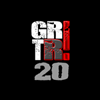
|







